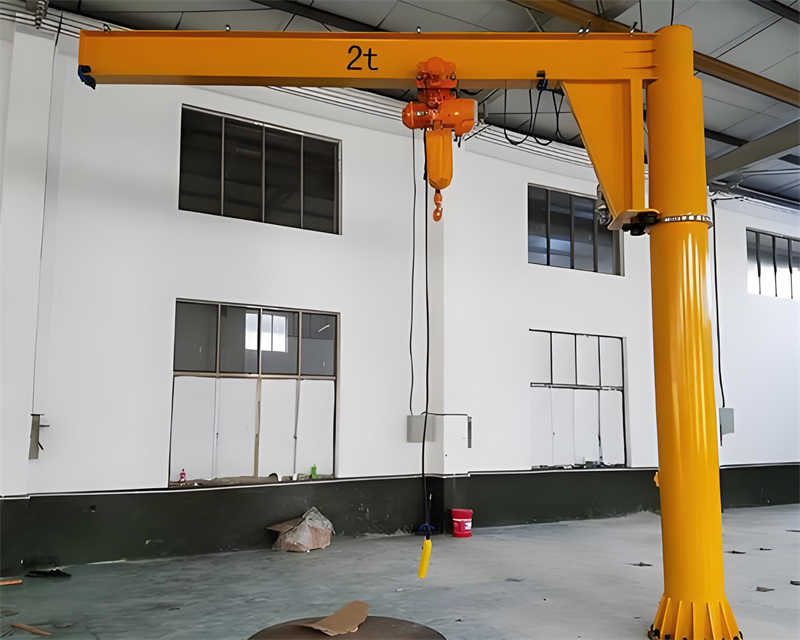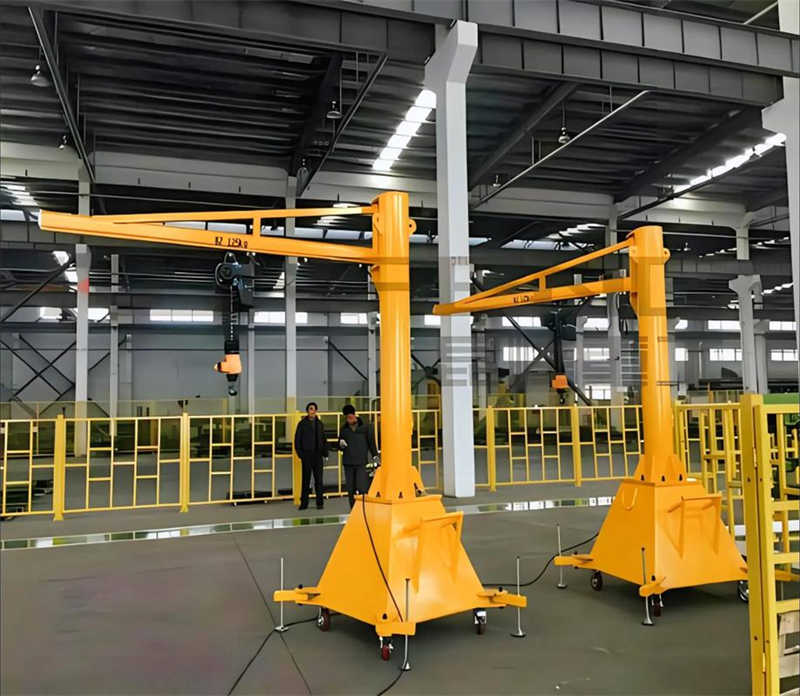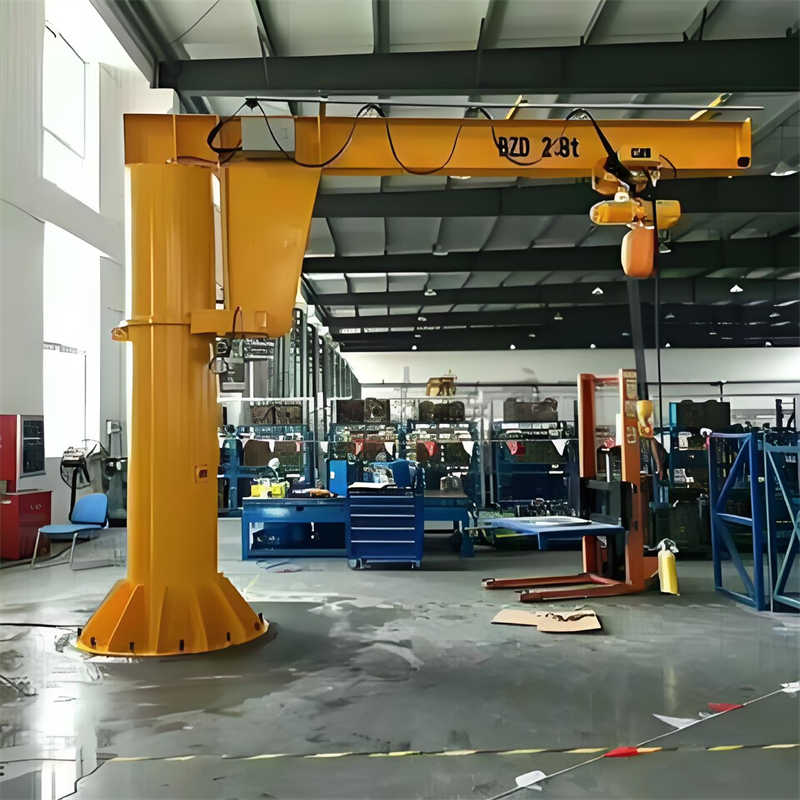14-May-2025
Workshop Jib Crane
1. Definition and Functions of Workshop Jib Cranes
A Workshop Jib Crane is a versatile lifting device designed for material handling in small to medium-sized workshops, warehouses, and industrial facilities. It consists of a vertical mast (or supporting column) and a horizontal boom that can rotate, allowing operators to lift, move, and position heavy loads with precision. These cranes are particularly valued for their space-saving design, flexibility, and ease of operation, making them ideal for environments where overhead cranes or forklifts may not be practical.
Key Functions:
- Efficient Material Handling: Enables safe lifting and transportation of heavy components, reducing manual labor and workplace injuries.
- Space Optimization: Compact design allows installation in tight spaces, unlike larger overhead cranes.
- Enhanced Productivity: Speeds up workflow in assembly lines, machine shops, and maintenance areas by providing quick access to tools and materials.
Common Applications:
- Mechanical Workshops: Used for lifting engines, transmissions, and heavy machinery parts.
- Assembly Lines: Assists in positioning components during manufacturing processes.
- Warehouses & Loading Bays: Helps move pallets, crates, and other heavy items.
- Repair and Maintenance Areas: Essential for servicing large equipment in automotive and industrial settings.
2. Main Types of Workshop Jib Cranes
1. Wall-Mounted Jib Crane
Description:
A wall-mounted jib crane is fixed to an existing wall or structural column, making it an excellent choice for facilities with limited floor space. The boom typically offers 180° or 270° rotation, allowing coverage of a semi-circular work area.
Advantages:
✔ Space-Saving: Does not require floor space, ideal for workshops with narrow layouts.
✔ Cost-Effective: Lower installation costs compared to freestanding models.
✔ Easy Integration: Can be mounted on reinforced walls or steel columns.
Limitations:
✖ Limited Rotation: Cannot provide full 360° coverage.
✖ Structural Requirements: The supporting wall must be strong enough to handle dynamic loads.
Best For:
- Small workshops with sturdy walls
- Assembly stations where materials are handled near walls
- Maintenance bays in automotive repair shops

2. Floor-Mounted Jib Crane
Description:
A floor-mounted jib crane is a freestanding unit anchored to a concrete foundation. It provides full 360° rotation, offering maximum coverage in open workshop areas. These cranes are available in various load capacities, from 0.5 tons to 10+ tons, making them suitable for heavy-duty applications.
Advantages:
✔ Full Rotation: Unrestricted movement for maximum flexibility.
✔ High Load Capacity: Can handle heavier weights compared to wall-mounted models.
✔ Stability: Solid foundation ensures safe operation even under heavy loads.
Limitations:
✖ Requires Floor Space: Needs dedicated installation space.
✖ Higher Installation Cost: Requires concrete foundation and professional setup.
Best For:
- Manufacturing plants with open floor plans
- Steel fabrication and welding shops
- Loading docks where heavy items need to be moved

3. Portable Jib Crane (Mobile Jib Crane)
Description:
A portable jib crane features a wheeled base, allowing it to be moved easily across a workshop. These cranes are typically lighter in capacity (ranging from 0.25 to 2 tons) but offer unmatched flexibility for temporary or multi-location lifting tasks.
Advantages:
✔ Mobility: Can be repositioned as needed, ideal for dynamic work environments.
✔ Quick Setup: No permanent installation required.
✔ Versatility: Useful in repair shops, construction sites, and warehouses.
Limitations:
✖ Lower Load Capacity: Not suitable for extremely heavy loads.
✖ Less Stability: Requires a level surface for safe operation.
Best For:
- Automotive repair centers
- Construction sites with changing lifting needs
- Small warehouses with varying material handling demands

Key Selection Factors for Workshop Jib Cranes
Load Capacity (0.5-10 Tons)
The load capacity is undoubtedly the most critical specification when selecting a workshop jib crane. These cranes typically offer capacities ranging from 500kg (0.5 tons) for light-duty applications up to 10 tons for heavy industrial use. When determining the right capacity:
- Consider both static and dynamic loads (account for at least 25% extra capacity for shock loads)
- Factor in future business growth and potential heavier applications
- Remember that capacity decreases as boom length increases
- For automotive shops, 1-2 tons generally suffices for engine work
- Manufacturing facilities often require 3-5 tons for mold handling
Pro tip: Always choose a crane rated for at least 1.25 times your maximum anticipated load to ensure safety and longevity.
Rotation Range (180°, 270°, or 360°)
The rotation capability significantly impacts operational flexibility:
- 180° rotation: Most space-efficient for wall-mounted units, perfect for workstations against walls
- 270° rotation: Offers greater coverage while still conserving space
- 360° rotation: Provides complete circular access, ideal for floor-mounted cranes in open areas
Electric rotation options are available for high-use applications, allowing precise positioning with push-button control. Manual rotation typically suffices for intermittent use.
Boom Length (2-6 Meters Standard)
Boom length determines your work envelope:
- Short booms (2-3m): Best for compact spaces and lighter loads
- Medium booms (3-4.5m): The most common range for general workshop use
- Long booms (4.5-6m+): Necessary for large work areas but reduce capacity
Measure your workspace carefully, considering:
- Obstructions like columns or machinery
- Required reach to service multiple workstations
- Clearance for moving materials
Construction Materials
The two primary material options each have distinct advantages:
Steel Construction:
- Highest strength and durability
- Better for heavy loads and harsh environments
- More resistant to wear and impact
- Generally more cost-effective for industrial use
Aluminum Construction:
- 30-40% lighter weight
- Naturally corrosion-resistant
- Easier to reposition (for portable models)
- Ideal for clean rooms or food processing
Most industrial applications favor steel for its superior strength-to-cost ratio, while aluminum shines where weight or corrosion resistance are priorities.

Industry Applications of Workshop Jib Cranes
Automotive Repair Shops
Jib cranes revolutionize vehicle service by:
- Safely lifting engines (typically 1-2 ton capacity needed)
- Removing and installing transmissions
- Positioning heavy components during repairs
- Supporting body work on large vehicles
The 270° wall-mounted variety is particularly popular in garages, allowing mechanics to swing engines directly over workbenches.
Small-Scale Manufacturing
In fabrication and production environments, jib cranes:
- Handle molds and dies (3-5 ton capacity common)
- Position heavy raw materials
- Assist in assembly of large components
- Support welding operations by rotating workpieces
Floor-mounted 360° models prove most versatile for manufacturing applications where materials need to move between multiple workstations.
Warehouse & Logistics Operations
Jib cranes enhance material handling by:
- Loading/unloading trucks in tight docks
- Transferring goods between conveyors and storage
- Assisting forklifts with precision placement
- Handling awkward or fragile loads
Portable jib cranes are particularly valuable in warehouses, allowing workers to bring lifting capability exactly where needed.
Frequently Asked Questions
Can Workshop Jib Cranes Be Customized?
Absolutely. Dongqi Crane offer numerous customization options:
- Custom boom lengths beyond standard sizes
- Special load capacities
- Various rotation mechanisms (manual, motorized)
- Different hook types (C-hook, lifting magnet, etc.)
- Color matching to facility schemes
- Special coatings for corrosive environments
- Unique mounting configurations
Customization ensures the crane perfectly fits your specific operational requirements and workspace constraints.
What’s the Recommended Maintenance Schedule?
Proper maintenance ensures safety and extends service life:
Monthly:
- Lubricate all pivot points and rotation mechanisms
- Inspect wire ropes or chains for wear
- Check for loose bolts or structural issues
- Examine electrical components (if applicable)
Annually:
- Complete structural inspection
- Load testing (recommended)
- Bearing replacement if needed
- Professional safety certification
As Needed:
- Replace worn hooks or slings
- Address any unusual noises or performance issues
- Repair surface damage to prevent corrosion
Conclusion
Workshop jib cranes offer exceptional value by combining affordability, space efficiency, and versatile material handling capability. When selecting your ideal model:
- Match capacity to both current and future needs
- Choose the rotation range that maximizes your workspace
- Select appropriate boom length for complete coverage
- Consider material based on environment and usage
- Explore customization options for perfect fit
For most small to medium workshops, a 2-ton capacity, 4m boom length, 270° rotation steel jib crane provides the best balance of capability and value. Larger operations may benefit from 360° floor-mounted models with 5+ ton capacities.
Remember that proper installation and regular maintenance are just as important as selecting the right specifications. Consult with lifting equipment specialists to ensure your jib crane solution meets all safety standards while optimizing your workflow efficiency.

